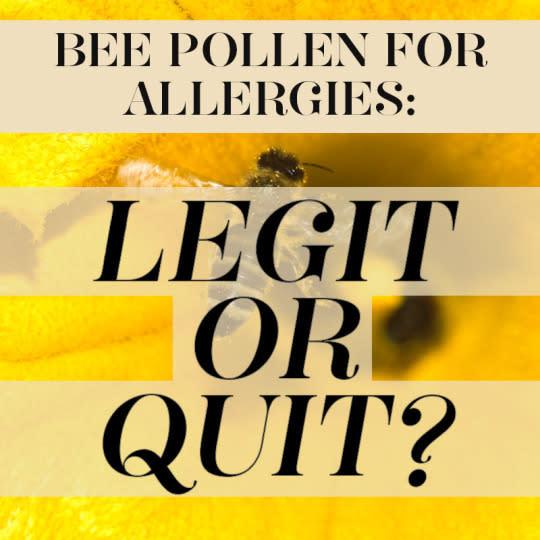Does Bee Pollen Help With Allergies?

Photo: Getty Images/Yahoo Health
Honey may be one of the oldest medicinal foods out there, but snifflers and sneezers on the hunt for relief are after a new bee byproduct: bee pollen.
Fans of the “superfood” supplement say a few sprinkles at mealtime can take the edge off of seasonal allergies and help fight conditions like asthma.
The idea: Expose yourself to small quantities of an allergen and you’ll boost your body’s immune response to it.
But is there actually scientific evidence this is true?
Where the trend began
The idea of bee pollen as a health remedy isn’t necessarily new: There’s evidence of its healing powers in Chinese medicine (as a diuretic or to combat intoxication), and the powers of bees are noted in religious texts and ancient Egyptian literature alike. Topically, bee pollen is said to heal skin conditions like eczema and rashes.
But in a society that glorifies so-called superfoods, bee pollen has quickly made headlines. “Supposedly, bee pollen is packed with protein, carbohydrates, vitamins (including B vitamins and vitamins C, K, D, and E), minerals (such as calcium, potassium, selenium, and iron), and antioxidants,” nutritionist Keri Gans tells Yahoo Health.
A trend toward eating healthfully, as well as celebrity endorsements — Victoria Beckham even eats bee pollen for breakfast! — all propelled bee pollen mainstream.
What the science says
Bee pollen’s ingredients list is enough to make you think it can help you build up a defense to any intruder — even pollen itself.
But let’s start with the nutritional stats: For one, it’s hard to know how much of each ingredient is actually in bee pollen, notes Gans — which makes a big difference in its total nutritional value. “Also, there isn’t any conclusive scientific evidence to date to support any health benefits,” she says.
Even more: On a volume basis, half of bee pollen is sugar, Mike Roussell, a nutritional consultant, tells Yahoo Health. “It contains proteins and essential fatty acids, but the amount you would consume is so small, it is negligible to what you get by eating the foods you eat via your daily diet.”
As for fighting those allergies? The idea that bee pollen could help alleviate symptoms is likely based on shady biology, Tanya Laidlaw, MD, director of translational research in allergy at Brigham and Women’s Hospital in Boston, tells Yahoo Health.
Related: Do Infrared Saunas Boost Circulation?
There are two major problems with the myth that if you eat bee pollen, you can slowly become desensitized to it, says Laidlaw. The first: The pollens in bee pollen are mostly from flowers, but “the vast majority of pollen allergies come from airborne pollen from trees and weeds that don’t flower,” she says. “There is much less of that kind of pollen in bee pollen.”
The second problem: While the concept of exposing yourself to pollen in small doses to fight an allergy is not totally out of left field (on a very simplistic level, that’s how allergy shots work), the process — and how your immune system reacts — is more complicated.
“There is no evidence that by eating or swallowing bee pollen, your body gets used to that pollen,” she says. For one, when you ingest pollen, your immune system doesn’t absorb it in the same way it would through an allergy shot.
One 2002 study found that allergy sufferers who took in honey (a bee product) saw no relief from the natural remedy.
The same results would be typical for topical treatments, Laidlaw says. Though immunizations go through your skin, the absorption process is different than if you were to rub something through your hands.
Related: Can Soaking in Epsom Salts Help You Destress — and Detox?
There’s also another serious issue: “If someone is truly allergic to pollen and they ingest pollen, they can have an allergic reaction,” Lily Pien, MD, an allergist at the Cleveland Clinic, tells Yahoo Health. Case reports have even demonstrated examples of serious, potentially life-threatening allergic reactions to 1 tablespoon of bee pollen.
Even when you get an allergy shot — a very low dose of an allergen, gradually increased — there is a risk of local and systematic allergic reactions, she says. The difference is, doctors can regulate allergy shots.
The Food and Drug Administration (FDA) doesn’t regulate supplements such as bee pollen, so there’s no real way to tell what’s actually in them or how much pollen you’re exposing yourself to. Pien adds: Not only is there pollen in bee pollen, but there can also be traces of pesticides, insecticides, fungi, and bacteria. In 2014, the FDA even warned against some bee pollen products aimed at weight loss that could include dangerous ingredients.
Another point of contention: a 2002 study published in the Annals of Allergy, Asthma, & Immunology. In the study, skin tests performed on over 200 people found substantial amounts of the pollen allergen in bee pollen, leading the researchers to state that bee pollen “retains its allergenic potential” and “further safety studies are needed to determine the appropriateness of this form of therapy.”
The verdict
Given the lack of supportive clinical data, expert opinion urging patients away from bee pollen, a lack of regulation, and the potential for serious side effects, we’d advise quitting bee pollen as a way to fight allergies.
While the nutritional benefits of bee pollen may exist, you’re likely better off scoring your vitamins and minerals from a healthy diet packed with fruits and vegetables — and sidestepping the sting of an allergic reaction.
Read this next: Can Drinking Alkaline Water Keep You Extra-Hydrated And Disease-Free?
Let’s keep in touch! Follow Yahoo Health on Facebook, Twitter, Instagram, and Pinterest.
